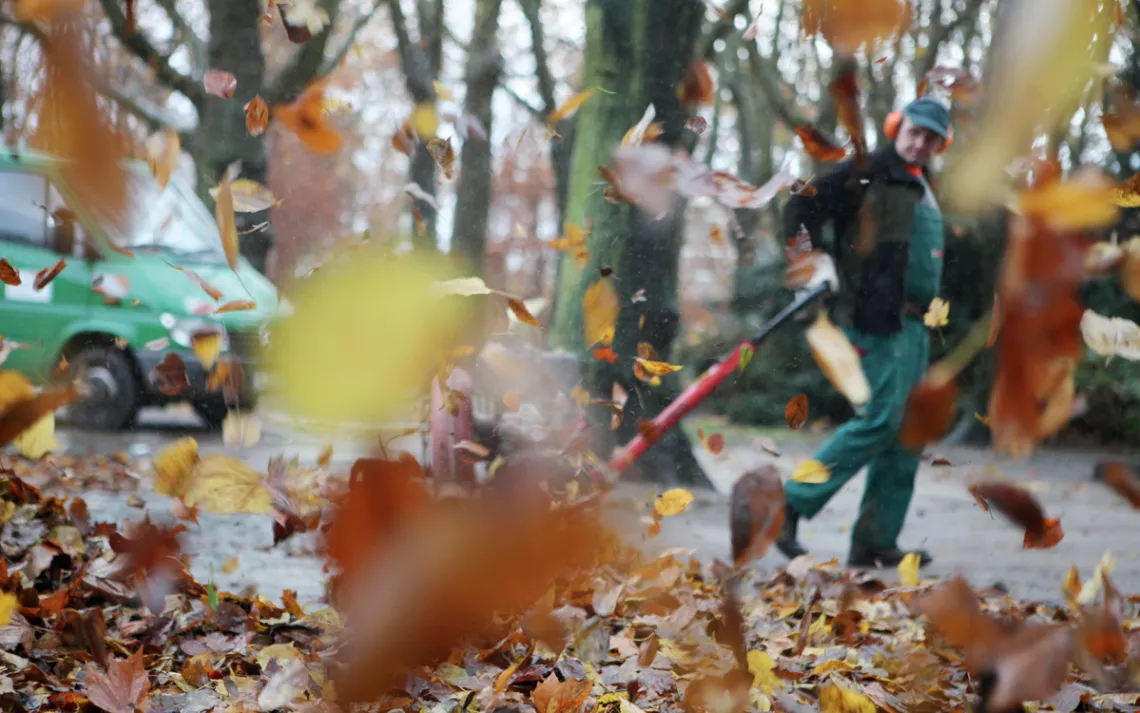Got the Leaf-Blower Blues? You're Not the Only One.
They're shrill. They pollute. Does it have to be this way?

Photo by imageBROKER/AP
James Fallows can't stand the ferocious, piercing sound of gas-powered leaf blowers. "This particular kind of whining noise has just driven me crazy," the journalist and author says. When that penetrating racket is present, Fallows, who once served as President Jimmy Carter's chief speechwriter, can't work, think, or concentrate unless he uses earplugs or noise-canceling headphones. A longtime writer for The Atlantic, Fallows quickly uncovered gas leaf blowers' dirty secrets: Their primitive two-stroke engines emit dangerous pollutants, and the noise often causes substantial and irreversible hearing loss in those who operate them.
When Fallows began working with neighbors to seek a ban on gas leaf blowers in 2015, many people thought he was wasting his time on a problem for the privileged. "The overwhelming reaction on forums like Nextdoor was, 'Oh, you weenies. Don't you have something better to do?'" Fallows says. The issue made him recall the 1965–70 Delano grape strike in California, when workers walked off the job because they were being exposed to high levels of pesticides for the sake of low-cost, perfect-looking grapes. "This stuck in my mind," he says, as something similar to "people wanting low-cost and perfectly manicured lawns."
Fallows's neighborhood in Washington, DC, was like many across the country—leaf blowers blared all day at about 100 decibels. The two-stroke engines combine gas and oil, spitting out as much as a third of this fuel mix as unburned aerosol. According to the California Air Resources Board (CARB), operating a commercial leaf blower for just one hour emits smog-forming pollution comparable to driving a new passenger car about 1,100 miles.
Fallows started organizing with just a few concerned neighbors. Eventually, about 20 residents from all parts of the city joined in and formed an advocacy group called Quiet Clean DC (QCDC). They met monthly for a few years and reached out to the local Advisory Neighborhood Commissions in all eight wards of Washington. QCDC cultivated relationships with city councilmembers, including Mary Cheh, who told the group's members that if they stuck with the effort to ban gas leaf blowers, so would she.
While the group sought out those who wanted a more tranquil soundscape, it also focused on social justice issues. "The real victims are the often non-English-speaking immigrants, low-wage workers who are being deafened by this," Fallows says. "I think we managed to shift the terrain of the argument."
In mid-2018, the council passed the Leaf Blower Regulation Amendment Act, making it illegal to operate a gas-powered leaf blower in the nation's capital and giving gardening companies more than three years to prepare for the ban, which took effect last January. Electric blowers, which are much cleaner and less noisy, remain legal. Through DC Sustainable Energy Utility, residents purchasing an electric leaf blower can get a $50 rebate, and commercial gardeners a $75 rebate.
"It's been a dramatic change," Fallows says. Since January, he says, he's heard the roar of gas leaf blowers just a "handful" of times. "You can hear the silence. What had been an unnecessary and almost omnipresent intrusion in people's lives is not there anymore." Fallows thought that the lawn companies might protest. Before the ban, some had said that if it passed, they'd refuse to work in DC. What surprised him was the "weakness of the countermovement." He says, "Just yesterday, I was going through Georgetown and I saw a major lawn-care company's truck full of battery-powered machines."
Retired psychotherapist and poet Larry Robinson says that the damage inflicted by leaf blowers goes beyond physical, that "the soul experiences mechanical sounds as an assault." The sound from gas blowers "overwhelms all other sounds," he says, "including music, conversation, the wind through the trees, or the songs of birds."
More than 100 US cities and towns have banned or restricted leaf blowers, and communities close to DC have taken notice, Fallows says. "We're getting people from both northern Virginia and Maryland writing us, saying, 'How can we extend this to Bethesda, to Arlington, to Falls Church?'"
On the other side of the country, California will halt the sale of most gas-powered leaf blowers, lawnmowers, and other small off-road engines (aptly known as SOREs) in 2024 but not restrict their use. Though the California legislation passed by a wide margin, Christopher Dilbeck of CARB says that a statewide ban is not realistic. According to Dilbeck, it would be impractical to have a requirement to stop using this kind of equipment as there are millions of pieces already in use in California.
Last year, smog-forming emissions from SOREs surpassed emissions from passenger cars in California. It's astounding but true: Gas leaf blowers, generators, and lawnmowers emit more air pollutants statewide than California's 14 million cars.
California State Assembly member Marc Berman, who introduced the legislation, says it's part of the state's plan to "drive an equitable transition away from fossil fuels that will benefit workers, communities, and the air we all breathe." Berman cites CARB's forecast that by 2035, more than 93 percent of leaf blowers, lawn mowers, and generators operating in California will be zero emission. The bill includes $30 million to ease that transition, which will be used to lower the cost of new equipment with point-of-sale discounts.
The transition is accelerating as manufacturers shift production toward electric machines. Makita, a Japanese power tool manufacturer, announced last March that it ceased production "of all gas-powered equipment worldwide . . . in response to the heightened awareness of global environmental issues."
Fallows strongly believes that someday firing up a gas leaf blower will be as unacceptable as lighting a cigarette in a nursery school. "I think the change will be slow, then it will be fast," he says, noting that during his lifetime, secondhand smoke has gone from wide acceptance to being outlawed in most public places. "Five or 10 years from now, people will think, Of course you'd have battery-powered equipment, if you have any equipment at all, because it's lower maintenance and much less destructive."
This article appeared in the Fall 2022 quarterly edition with the headline "The Sound of Silence."
 The Magazine of The Sierra Club
The Magazine of The Sierra Club



